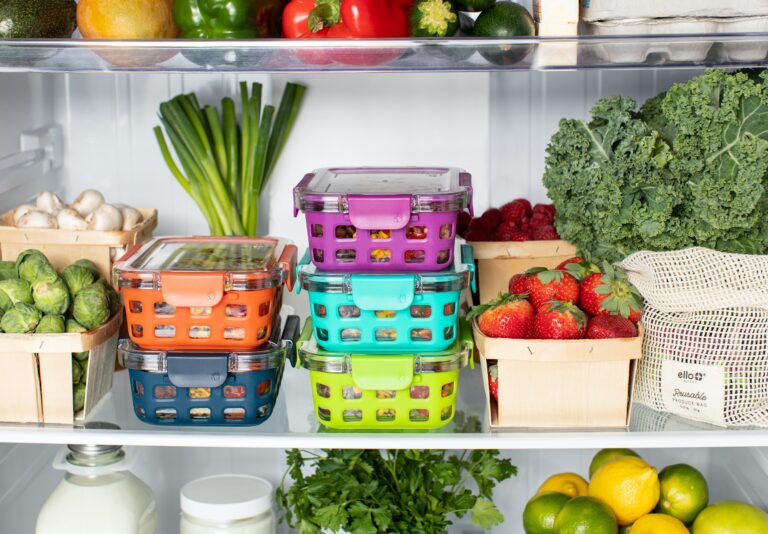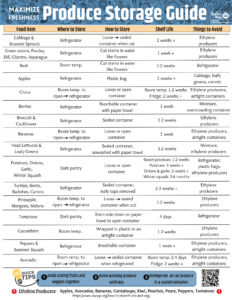Food and Nutrition Education Resources
How to Best Store Fruits and Vegetables
By: Jaz Popa, 12/2/2022

Have you ever purchased fresh produce only for it to go bad a few days after you bought it? It might be because you aren’t storing your produce properly. Most produce likes to stay cool, dry, and out of contact with air. The one golden rule is to never store your produce wet. Either don’t wash your produce until use or be sure to completely dry it before storage since water can cause premature rotting. If stored properly, your fruits and veggies should stay fresh for weeks, preventing waste and stretching your food dollars! Check out the list below to learn how to specifically store different types of produce.
Herbs like parsley, cilantro, basil, chives, green onions, and dill do best when stored like flowers. Trim the stems and place them in a cup of shallow water with a bag loosely wrapped around the top in the refrigerator. Change out the water every few days. (This is also the best way to store asparagus!) Herbs can also be wrapped in a damp paper towel and stored in an airtight container in your fridge if you’re worried about a glass toppling over. Just remember to keep the paper towel damp. The only exception to this is basil. Basil HATES the cold. Never store basil in your fridge; always store it at room temperature.
When storing bananas, be sure to remove them from any bags. Bananas produce ethylene gas, causing some fruit, including themselves, to ripen faster. Keep them connected in the bunch and wrap plastic wrap or beeswax cloth over the top of the bananas to slow down the amount of ethylene gas they emit. If they do start to turn brown and you aren’t ready to consume them, you can store them in the fridge to prevent further ripening. Just remember not to store them near any ethylene–sensitive foods. Click here to learn which foods are ethylene producers and which are ethylene sensitive.
Citrus can be stored at room temperature; however, they last much longer in the fridge. If you do store on the counter, only do so for about one week. Then move them to the fridge to increase their longevity. You can store oranges and grapefruit with apples and pears because they are not ethylene–sensitive, but limes and lemons are. So be sure to store those away from ethylene producers to prevent premature rotting. If you have citrus in the fridge that is starting to get a little dry, you can store them in a sealed container of water. This helps the citrus retain its moisture.
Although you can store apples at room temperature, they quickly turn soft and mealy. Store apples in the fridge in a plastic bag to keep them fresh and crisp for weeks. If you have other unripe fruit like peaches, pears, nectarines, avocados, or plums, store them at room temperature for a day or two to ripen and get a little soft. Then store them in a bag in the fridge where they will stay fresh for a few weeks. If you have unripe mangos, store them at room temperature until slightly soft. Then store them in the fridge loose. Be sure to store apples and pears loose as well and separately from other ethylene-sensitive fruits. Click here to learn which foods are ethylene producers and which are ethylene sensitive.
Winter squashes like pumpkins, acorn, butternut, or spaghetti squash are best stored in a dark, room temperature area. That’s all these hearty, thick-skinned gourds need. Winter squashes are storage vegetables, so they should stay fresh for at least a few weeks. If you don’t plan to use the whole squash in one sitting, peel, cut and store the rest in an airtight container in the fridge to use later.
Potatoes and sweet potatoes like dark, cool, humid areas like a basement or wine cooler. Don’t refrigerate them, and be sure to allow for air circulation, so take them out of the plastic bag they usually come in. Do not store them with onions, bananas, or other ethylene-producing fruit to prevent premature ripening. Your potatoes should stay fresh for a few weeks if stored like this. Do not eat potatoes if there is any green flesh or skin, as this indicates toxic levels of two glycoalkaloids. However, if the potatoes have sprouts or eyes, they should be safe to eat as long as they are still firm. Just trim away the sprouts, but when in doubt, throw it out!
Unlike potatoes, onions and garlic prefer low humidity. Store them away from moisture in a cool, dark place with air circulation, like a pantry. Do not store them in a refrigerator or in the plastic bag they often come in. Remember to keep them separate from potatoes to prevent the potatoes from ripening too quickly. It is okay if they sprout green shoots. Both the shoot and bulbs are safe to consume as long as the bulbs are firm. Store leftover cut onions in the fridge in a sealed container.
If you have any roots or tubers with leafy green tops attached, be sure to remove those down to the root and store them separately, as you would leafy greens. This is important because the greens draw moisture out of the vegetable. Roots like beets, turnips, rutabagas, carrots, parsnips, ginger, and radishes are hearty vegetables that don’t require a lot of fuss. Store them in an airtight container in the fridge and they should stay fresh for a few weeks.
Broccoli, cauliflower, cabbage, and brussels sprouts are all hearty vegetables that like to be stored in the fridge. If uncut, store them in a loosely sealed bag. Once cut, store them in an airtight container.
Leafy greens like lettuce, spinach, kale, chard, collards, or beats, and carrot tops are notorious for going bad quickly. To prevent this, do NOT wash them until you are ready to consume them. Excess moisture is what causes leafy greens to go bad, so we want to prevent wet greens at all costs. Store leafy greens in the fridge in an airtight container with a dry paper towel to soak up moisture. Every few days, or once the paper towel is wet, switch it out for a new, dry one. However, if it is soaking up too much moisture and the leaves are wilting, remove the paper towel. Also, if you see any brown, slimy leaves, remove those to prevent further rotting. If you have a head of wilted lettuce that you want to perk back up, trim a little off the stem, and soak the stem in cold water with the leaves up until the leaves are crisp again.
Other softer–skinned produce like zucchini, bell peppers, grapes, strawberries, raspberries, blueberries, or cherries store best in the fridge. Store fruit in an airtight container and vegetables in loose bags. Be sure that the produce is dry during storage, and do not wash them until you are ready to consume them. This is untrue for tomatoes and cucumbers, however. Tomatoes and cucumbers do not like the cold and become mealy when stored in the fridge. Instead, store them in a dark area at room temperature.
Other thicker-skinned fruits like pineapple, watermelon, or cantaloupe can be stored at room temperature for a few days. Because of their size, it’s best to cut them before storing them in the fridge. After cutting, store them in an airtight container in the fridge.
Click the image below for a printable produce storage guide to hang in your kitchen!
Available in English and Spanish.
Extra Resources:
How to Keep Your Produce Fresh for Weeks
Eating Well – The Best Way to Store Fruits and Veggies
Self – How to Store Pretty Much Any Kind of Produce
Food Insight – How to Store Fresh Produce, Maximize Shelf Life, and Minimize Food Waste
Food Revolution Network – How to Store Produce: A Guide to Fruits and Vegetables

